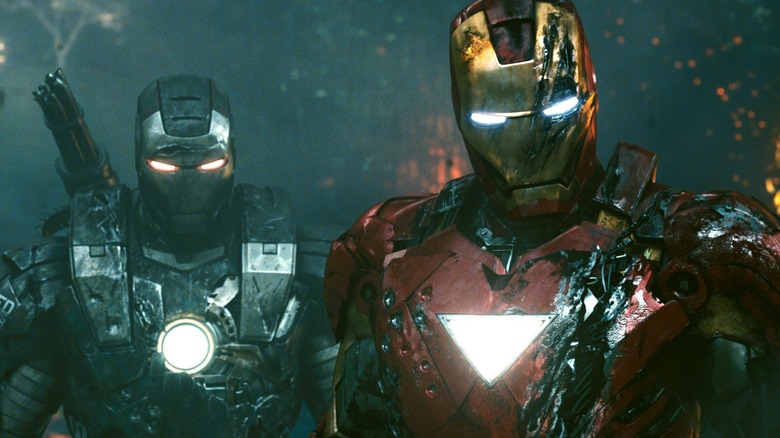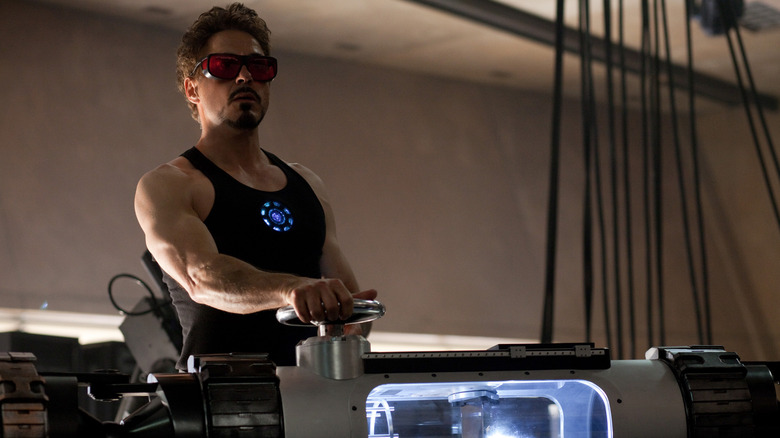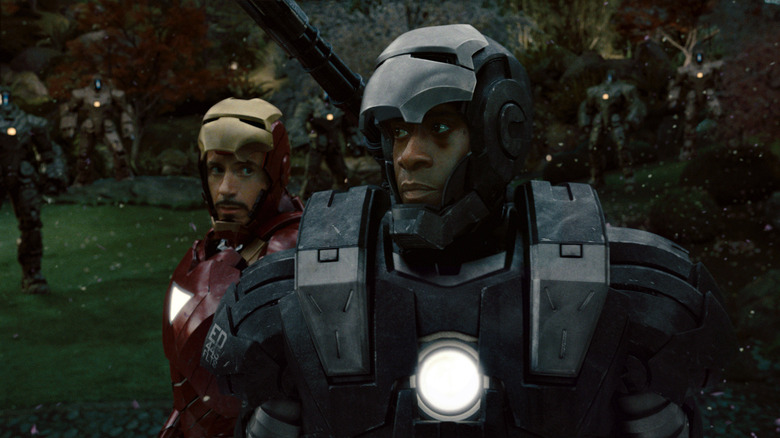Iron Man 2's Rushed Production Pushed The Cast And Crew To Their Limits
Jon Favreau's 2010 superhero flick "Iron Man 2" was the third film in the Marvel Cinematic Universe, but it was really the first. The 2008 films prior to "Iron Man 2" — Favreau's own "Iron Man" and Louis Leterrier's "The Incredible Hulk" — were distributed by Paramount and by Universal respectively, and their references to a larger universe (the Avengers Initiative in "Iron Man," Robert Downey Jr.'s cameo in "Hulk") were just cute winks for attentive audience members. It wasn't until 2009 that Disney would buy the film rights to thousands of Marvel characters and set the stage for the real MCU. While "Iron Man 2" and "Thor" were sloppy, lackluster affairs, they were nonetheless enormous hits, proving that a press release can sometimes gather an audience better than a single quality film.
Someone who would agree with the above — perhaps brash — assessment of "Iron Man 2" are the makers of "Iron Man 2." While Favreau had the time, and a script, to guide him through the 2008 original, the sequel was greenlit immediately after its release, sans script. According to a 2010 article in the Los Angeles Times, "Iron Man 2" was written pretty much on the fly, with SFX set pieces already under construction before shooting actually began. And according to a 2020 retrospective in Vulture, screenwriter Justin Theroux was rewriting the story so often that he eventually required bedrest.
All around, making "Iron Man 2" was an exhausting nightmare.
Sent into battle, dead
In the Times article, Favreau admits what a harrowing experience it was. The Times — reporting prior to the film's release — attempts to remain upbeat about the hard work, pointing out that it was a lot of effort for Favreau and Downey, Jr. to capture the ineffable alchemy that made Tony Stark tick. Like in the first "Iron Man," Downey Jr. was permitted to improvise, often trying to find the direction of a scene on the day of filming. However, because so many set pieces were already in production elsewhere, a lot of scripting and approval needed to be made at the last minute to get those improvised moments into a larger picture. "I feel like I'm finishing this one the way El Cid finished the war, strapped onto his horse by his men and sent into battle dead," Favreau said at the time.
It's worth noting that "Iron Man" was filmed with a good deal of practical effects, which Favreau's preference at the time. "Iron Man 2," in contrast, featured far more CGI.
Theroux felt the crunch worst, having to actually record the drama on the page, each day recalibrating the script to match what the improv and the exploration found that day. "Iron Man 2" was not exactly made up on the fly, but the production certainly seems to have been an exquisite corpse, just one made for millions upon millions of dollars. According to the Times, actor Don Cheadle (replacing Terrence Howard) felt lost in the chaos.
The inside scoop
The retrospective in Vulture is certainly more frank, although the people interviewed requested anonymity; it seems no one wanted to go on record lambasting a troubled production in what has become the largest film franchise of all time. Vulture refers to this person only as a "Marvel insider," who commented on the stresses everyone felt, especially Theroux. There was, it seems a struggle to meet the mandates coming from the studio, stymieing creativity:
"There was the sense he was overwhelmed with trying to keep this point in the center between what Marvel wanted to do, what they could do, what they had already done, and what everyone would allow. That target is pretty small. It changes by the hour. They're making wholesale changes to the story when the cameras are rolling. At night, [Theroux] is doing writing gyrations trying to make it all make sense."
The mysterious insider was the one who pointed out that the stress of the situation manifested in Theroux's back, and the screenwriter was in pain near the end of the production. However, a representative for Theroux claimed that this wasn't true and that "Iron Man 2" wasn't stressful for him. Theroux hasn't commented directly.
The stories of the speedy production of "Iron Man 2" confirm a popular criticism of the MCU: That the studio is the auteur of the piece, and not the screenwriter or the director. Story beats are invented in a board room, connection to other movies are posited, and VFX houses are sometimes hired to start working on action set pieces prior to the hiring of a director or writer. In a /Film interview, one director likened working on an MCU film to completing mile 16 of a bridge that's been under construction for 15 years.
Some directors can work like that. Others, it seems, struggle.


